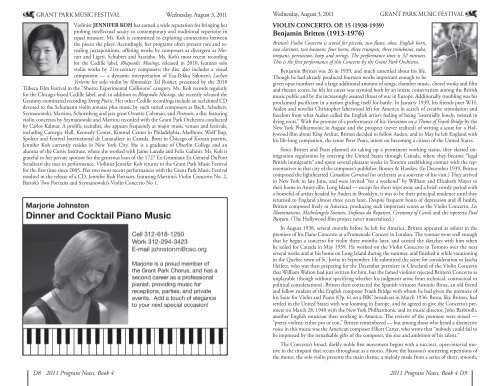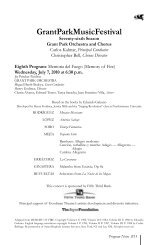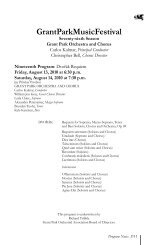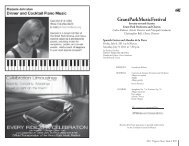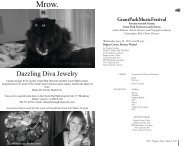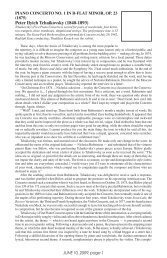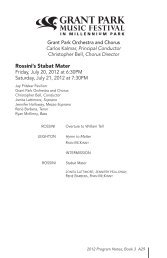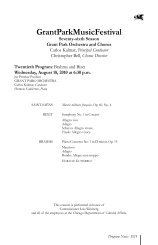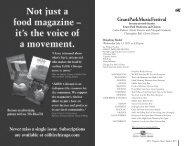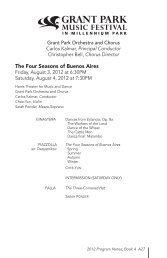Program Notes PDF - The Grant Park Music Festival
Program Notes PDF - The Grant Park Music Festival
Program Notes PDF - The Grant Park Music Festival
Create successful ePaper yourself
Turn your PDF publications into a flip-book with our unique Google optimized e-Paper software.
GRANT PARK MUSIC FESTIVAL Wednesday, August 3, 2011 Wednesday, August 3, 2011 GRANT PARK MUSIC FESTIVAL<br />
Violinist Jennifer Koh has earned a wide reputation for bringing her<br />
probing intellectual acuity to contemporary and traditional repertoire in<br />
equal measure. Ms. Koh is committed to exploring connections between<br />
the pieces she plays. Accordingly, her programs often present rare and revealing<br />
juxtapositions, offering works by composers as divergent as Mozart<br />
and Ligeti, Schubert and Saariaho. Ms. Koh’s most recent recording<br />
for the Cedille label, Rhapsodic Musings, released in 2010, features solo<br />
violin works by 21st-century composers; the disc also includes a visual<br />
component — a dynamic interpretation of Esa-Pekka Salonen’s Lachen<br />
Verlernt for solo violin by filmmaker Tal Rosner, presented by the 2010<br />
Tribeca Film <strong>Festival</strong> in the “Shorts: Experimental Collisions” category. Ms. Koh records regularly<br />
for the Chicago-based Cedille label, and, in addition to Rhapsodic Musings, she recently released the<br />
Grammy-nominated recording String Poetic. Her other Cedille recordings include an acclaimed CD<br />
devoted to the Schumann violin sonatas plus music by such varied composers as Bach, Schubert,<br />
Szymanowski, Martinu, Schoenberg and jazz great Ornette Coleman, and Portraits, a disc featuring<br />
violin concertos by Szymanowski and Martinu recorded with the <strong>Grant</strong> <strong>Park</strong> Orchestra conducted<br />
by Carlos Kalmar. A prolific recitalist, she appears frequently at major music venues and festivals,<br />
including Carnegie Hall, Kennedy Center, Kimmel Center in Philadelphia, Marlboro, Wolf Trap,<br />
Spoleto and <strong>Festival</strong> International de Lanaudiere in Canada. Born in Chicago of Korean parents,<br />
Jennifer Koh currently resides in New York City. She is a graduate of Oberlin College and an<br />
alumna of the Curtis Institute, where she worked with Jaime Laredo and Felix Galimir. Ms. Koh is<br />
grateful to her private sponsor for the generous loan of the 1727 Ex Grumiaux Ex General DuPont<br />
Stradivari she uses in performance. Violinist Jennifer Koh returns to the <strong>Grant</strong> <strong>Park</strong> <strong>Music</strong> <strong>Festival</strong><br />
for the first time since 2005. Her two most recent performances with the <strong>Grant</strong> <strong>Park</strong> <strong>Music</strong> <strong>Festival</strong><br />
resulted in the release of a CD, Jennifer Koh Portraits, featuring Martinu’s Violin Concerto No. 2,<br />
Bartok’s Two Portraits and Szymanowski’s Violin Concerto No 1.<br />
Violin Concerto, Op. 15 (1938-1939)<br />
Benjamin Britten (1913-1976)<br />
Britten’s Violin Concerto is scored for piccolo, two flutes, oboe, English horn,<br />
two clarinets, two bassoons, four horns, three trumpets, three trombones, tuba,<br />
timpani, percussion, harp and strings. <strong>The</strong> performance time is 32 minutes.<br />
This is the first performance of this Concerto by the <strong>Grant</strong> <strong>Park</strong> Orchestra.<br />
Benjamin Britten was 26 in 1939, and much unsettled about his life.<br />
Though he had already produced fourteen works important enough to be<br />
given opus numbers and a large additional amount of songs, chamber music, choral works and film<br />
and theater scores, he felt his career was stymied both by an innate conservatism among the British<br />
music public and by the increasingly assured threat of war in Europe. Additionally troubling was his<br />
proclaimed pacificism in a nation girding itself for battle. In January 1939, his friends poet W.H.<br />
Auden and novelist Christopher Isherwood left for America in search of creative stimulation and<br />
freedom from what Auden called the English artist’s feeling of being “essentially lonely, twisted in<br />
dying roots.” With the promise of a performance of his Variations on a <strong>The</strong>me of Frank Bridge by the<br />
New York Philharmonic in August and the prospect (never realized) of writing a score for a Hollywood<br />
film about King Arthur, Britten decided to follow Auden, and in May he left England with<br />
his life-long companion, the tenor Peter Pears, intent on becoming a citizen of the United States.<br />
Since Britten and Pears planned on taking up a permanent working status, they skirted immigration<br />
regulations by entering the United States through Canada, where they became “legal<br />
British immigrants” and spent several pleasant weeks in Toronto establishing contact with the representatives<br />
in that city of the composer’s publisher, Boosey & Hawkes. (In December 1939, Britten<br />
composed the lighthearted Canadian Carnival for orchestra as a souvenir of his visit.) <strong>The</strong>y arrived<br />
in New York in late June, and were invited “for a weekend” by William and Elizabeth Mayer to<br />
their home in Amityville, Long Island — except for short trips away and a brief, rowdy period with<br />
a houseful of artists headed by Auden in Brooklyn, it was to be their principal residence until they<br />
returned to England almost three years later. Despite frequent bouts of depression and ill health,<br />
Britten composed freely in America, producing such important scores as the Violin Concerto, Les<br />
Illuminations, Michelangelo Sonnets, Sinfonia da Requiem, Ceremony of Carols and the operetta Paul<br />
Bunyan. (<strong>The</strong> Hollywood film project never materialized.)<br />
In August 1938, several months before he left for America, Britten appeared as soloist in the<br />
premiere of his Piano Concerto at a Promenade Concert in London. <strong>The</strong> venture went well enough<br />
that he began a concerto for violin three months later, and carried the sketches with him when<br />
he sailed for Canada in May 1939. He worked on the Violin Concerto in Toronto over the next<br />
several weeks and at his home on Long Island during the summer, and finished it while vacationing<br />
in the Quebec town of St. Jovite in September. He submitted the score for consideration to Jascha<br />
Heifetz, who was then preparing for the December premiere in Cleveland of the Violin Concerto<br />
that William Walton had just written for him, but the famed violinist rejected Britten’s Concerto as<br />
unplayable (though without specifying whether his judgment arose from technical, contractual or<br />
political considerations). Britten then contacted the Spanish virtuoso Antonio Brosa, an old friend<br />
and fellow student of the English composer Frank Bridge with whom he had given the premiere of<br />
his Suite for Violin and Piano (Op. 6) on a BBC broadcast in March 1936. Brosa, like Britten, had<br />
settled in the United States with war looming in Europe, and he agreed to give the Concerto’s premiere<br />
on March 28, 1940 with the New York Philharmonic and its music director, John Barbirolli,<br />
another English musician then working in America. <strong>The</strong> reviews of the premiere were mixed —<br />
“pretty violent: either pro or con,” Britten remembered — but among those who heard a distinctive<br />
voice in this music was the American composer Elliott Carter, who wrote that “nobody could fail to<br />
be impressed by the remarkable gifts of the composer, the size and ambition of his talent.”<br />
<strong>The</strong> Concerto’s broad, darkly noble first movement begins with a succinct, open-interval motive<br />
in the timpani that recurs throughout as a motto. Above the bassoon’s muttering repetitions of<br />
the motto, the solo violin presents the main theme, a melody made from a series of short, smooth,<br />
D8 2011 <strong>Program</strong> <strong>Notes</strong>, Book 4<br />
2011 <strong>Program</strong> <strong>Notes</strong>, Book 4 D9


